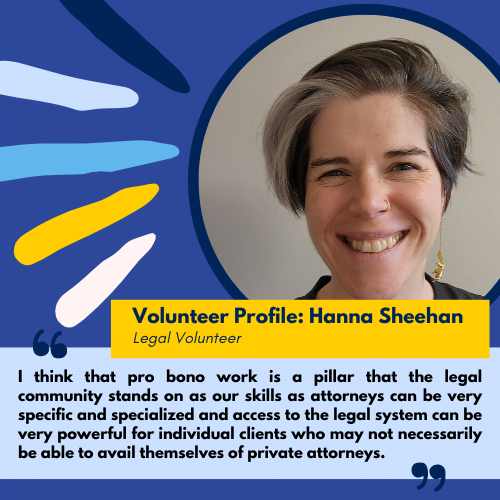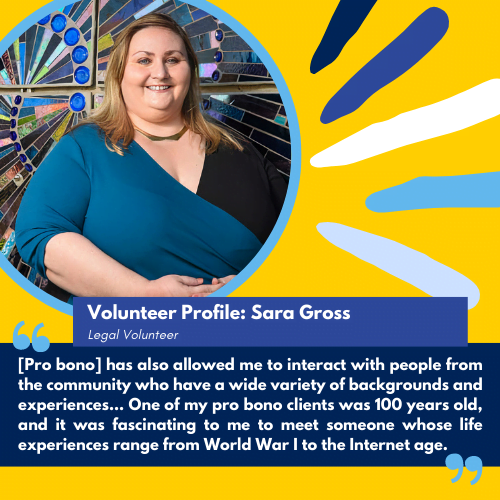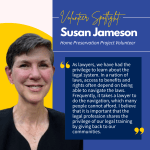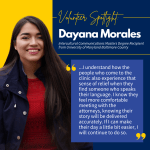Volunteer Profile: Sara Gross, Esq. & Hanna Sheehan, Esq.
 What brought you to begin and continue to build your legal career in Maryland?
What brought you to begin and continue to build your legal career in Maryland?
Hanna Sheehan (HS): I'm a lifelong Marylander - grew up here, went to school here, and lived here my entire life. I chose to stay in Maryland because I wanted to continue to live in my home state and be involved in the community where I live.
Can you tell me a little about your private practice?
Sara Gross (SG): I'm the Chief of the Affirmative Litigation Division for the Baltimore City Department of Law. I represent the city as a plaintiff in various lawsuits against companies that have harmed Baltimore, including a suit against fossil fuel companies for their deceptive practices that brought about climate change and pharmaceutical manufacturers and distributors for causing the opioid crisis.
HS: Not applicable to me! I work for the government. But if you do need an answer - I have always worked in public service - either government or non-profit work - and I currently work in the civil litigation division for the Baltimore City Law Department.
 Which of PBRC’s projects do you volunteer with, and how did you get involved?
Which of PBRC’s projects do you volunteer with, and how did you get involved?
SG: I volunteer for the estate planning clinics. I got an email several years ago about training for them and decided to sign up. It seemed like a good way to learn about a new area of the law, and it wouldn't give rise to any conflicts with my day job, as some pro bono opportunities do.
HS: The estate planning clinics. I got involved through my colleagues encouraging me to volunteer - specifically my colleague and friend Sara Gross - and have been doing the clinics for several years now.
This project addresses estate planning for seniors (and others) in the Baltimore community. It provides a crucial service to individuals seeking to ensure that their wills are completed and to ensure that they have advanced directives and powers of attorney in place should they need one. It gives these individuals peace of mind and assurance that their wishes will be honored even if they are no longer able to communicate them in person.
What do you find interesting about this work?
SG: I like meeting the clients and being able to assist them directly. While I've always worked in government service, my clients have largely been institutional, and an individual City resident won't necessarily feel the benefit of my work directly. This is a great opportunity to work with actual clients and I get to provide them with a service that helps them with a need. The clients are always so grateful that a service like this exists.
HS: This work is interesting because it is a wonderful way to meet and directly affect the lives of individual clients in a relatively discrete way. The entire experience has been rewarding as the work is tangible and concrete - at the end of the clinic, the client has a will, advance directive, and power of attorney that they can leave with.
How does the project make it easy to volunteer?
SG: The training at PBRC is excellent. I really appreciate that the clinics are full service, and that the organization provides printers, copies, etc., so that everything for the client is done the same day. The templates provided for the various documents are also helpful.
HS: The trainings and staff support are excellent. There are opportunities for mentors and assistance at the clinics and if you're new you can be mentored directly while your assisting clients. Further, all of the forms are readily available and provided at the clinics.
Tell me about a client you have met while working with PBRC.
HS: At the last clinic I volunteered at, Sara and I assisted an elderly couple with their estate planning. At the end of the clinic, they expressed how relieved that they were they had completed these important documents and told us that they were very grateful for the assistance.
How has doing pro bono work changed you?
SG: I think it is fulfilling to be able to use my legal training to give back. It has also allowed me to interact with people from the community who have a wide variety of backgrounds and experiences. Typically, I interact mostly with lawyers and so it is nice to get out of that bubble. One of my pro bono clients was 100 years old, and it was fascinating to me to meet someone whose life experiences range from World War I to the Internet age.
HS: It has made me more cognizant of some of the challenges that the legal system can pose to lay people and has also provided me insight into how difficult it can be to understand how that system works if you're not involved with it every day.
It has made my legal career more fulfilling because it provides me with the opportunity to engage in direct client services through volunteer work.
How important do you think pro bono work is to the legal profession?
SG: It's extremely important in my mind that people who are able to give back should do so. Not everyone is fortunate to have the education and experience that lawyers have. To paraphrase JFK, to whom much is given, much is required.
HS: Extremely important. I think that pro bono work is a pillar that the legal community stands on as our skills as attorneys can be very specific and specialized and access to the legal system can be very powerful for individual clients who may not necessarily be able to avail themselves of private attorneys.
What message would you give to attorneys thinking about volunteering?
SG: Do it. Don't let the fact that it might be a new area of the law hold you back. I was nervous about it, too, but the PBRC staff, mentors, and other volunteers are always around to lend a hand.
HS: It's not as hard as you think! There are a lot of great resources available, and many people will mentor and assist you if you want to be involved. There are all kinds of pro bono opportunities - it is not one size fits all - and I can guarantee there is something out there that you can help someone with.
For more information about volunteering in Maryland, please contact: education@probonomd.org







